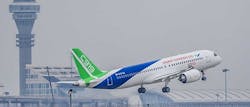Boeing’s disaster could turn China into an aviation superpower
Continue reading original article
The Intelligent Aerospace take:
April 15, 2019-With more than a billion residents and a continually growing economy, China is poised to drive the economic engine of avation in the coming decades. It is estimated that the Asian nation will need around 9,000 new commercial aircraft in the next 20 years to meet demand. Last month, China ordered 300 new jets from Airbus for $35 billion. The European manufacturer has enjoyed a relative duopoly with American powerhouse Boeing for orders with world carriers.
Now, the Commercial Aircraft Corporation of China, Ltd. (COMAC) is building an Airbus A320 clone dubbed the C919. COMAC partnered the UTC Aerospace Systems, Collins Aerospace, Honeywell, and the French technology company Thales. The engines also come from the French-American alliance of Safran and General Electric. The C919 follows the Airbus assembly model of having the major areas like fuselage, wings, engines, and landing gear built and delivered with the internal cabin fittings taken care of by COMAC.
Irving noted that COMAC has found success with the C919 and are "moving on" by "developing a larger widebody jet to compete with the Boeing 787 and Airbus A350 to be ready by 2025, this time partnering with the Russians." The writer, who penned Wide-Body: The Triumph of the 747, concludes that there "will no doubt be setbacks on the way, but the Boeing-Airbus duopoly will for sure eventually lose its dominance of the skies."
Related: China aims to nearly double its number of civil airports by 2035
Related: Boeing delivers its 2,000th airplane to China
Related: China wants to put a solar farm in space by 2025
Jamie Whitney, Associate Editor
Intelligent Aerospace
Ready to make a purchase? Search the Intelligent Aerospace Buyer's Guide for companies, new products, press releases, and videos
